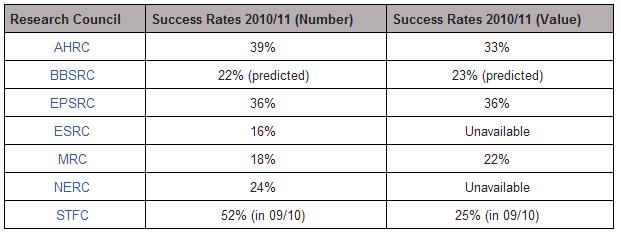 Welcome to RCUK Demand Management week on the blog! Today’s focus is on the Engineering and Physical Sciences Research Council (EPSRC) and the steps they have taken to enforce demand management. The EPSRC was the first Research Council to initiate a policy for demand management and it was particularly controversial at the time. Back in April 2010 the EPSRC launched the ‘12-month cooling-off period for repeatedly unsuccessful applicants‘ as a way of reducing the number of applications they received through individual researcher sanctions. This policy restricts repeatedly unsuccessful applicants to submitting one application (as PI or Co-I) for a 12-month period.
Welcome to RCUK Demand Management week on the blog! Today’s focus is on the Engineering and Physical Sciences Research Council (EPSRC) and the steps they have taken to enforce demand management. The EPSRC was the first Research Council to initiate a policy for demand management and it was particularly controversial at the time. Back in April 2010 the EPSRC launched the ‘12-month cooling-off period for repeatedly unsuccessful applicants‘ as a way of reducing the number of applications they received through individual researcher sanctions. This policy restricts repeatedly unsuccessful applicants to submitting one application (as PI or Co-I) for a 12-month period.
What is the criteria for ‘repeatedly unsuccessful applicants’? – Researchers are considered repeatedly unsuccessful if they meet both of the following criteria:
- Three or more applications within a two-year period ranked in the bottom half of a funding prioritisation list or rejected before panel (including administrative rejects);
- An overall personal success rate of less than 25% over the same two years.
The two year period is calculated from the date on the letter the applicant receives informing them of the decision not to fund their application.
Will all applications to EPSRC be taken into account? – All full proposals submitted by an applicant as PI will be considered over a rolling two-year period. Examples of applications not taken into account include: training grants, outline applications, applications submitted as Co-I, and all activities where peer review is led by another funding body. See the EPSRC website for a full list.
What sanction is applied to applicants who meet the criteria? – They will be allowed to submit only one application during the next 12 month period and asked to review their submission behaviour with their university.
How are people notifed that they have met the criteria? – They will be emailed by EPSRC. The Research Development Unit are also notified and keep a central record of BU applicants who have met the criteria.
I am interested in applying to EPSRC. How can I make sure my application stands the best chance of being funded? – BU has established an internal peer review scheme (Research Proposal Review Service) which has been up and running in its current form for almost 12 months now. The scheme is managed by Caroline O’Kane and a whopping 21 proposals have been reviewed since July. If you are submitting an bid to EPSRC then I strongly encourage you to work with Caroline through the RPRS. You can also check the Blog to see what proposal writing sessions are running at BU. For example, on 23 and 24 November Dr Martin Pickard will be visiting BU to run sessions specifically focusing on writing and preparing applications for Research Council funding – read more and book a place here. Martin’s sessions are excellent and always well received, and I would encourage anyone considering applying for research funding to attend.
 Welcome to RCUK Demand Management week on the blog! There has been a lot of discussion and debate about demand management over the past 12 months or so, particularly in response to the
Welcome to RCUK Demand Management week on the blog! There has been a lot of discussion and debate about demand management over the past 12 months or so, particularly in response to the 
 What resources and processes has BU put in place to support Demand Management? – BU has established an
What resources and processes has BU put in place to support Demand Management? – BU has established an 











 BU attendance at third annual GCPHR meeting in June
BU attendance at third annual GCPHR meeting in June Interactive Tangible and Intangible Heritage Applications – BU student work featured in new book chapter
Interactive Tangible and Intangible Heritage Applications – BU student work featured in new book chapter Second NIHR MIHERC meeting in Bournemouth this week
Second NIHR MIHERC meeting in Bournemouth this week MSCA Postdoctoral Fellowships 2025 Call
MSCA Postdoctoral Fellowships 2025 Call ERC Advanced Grant 2025 Webinar
ERC Advanced Grant 2025 Webinar Horizon Europe Work Programme 2025 Published
Horizon Europe Work Programme 2025 Published Horizon Europe 2025 Work Programme pre-Published
Horizon Europe 2025 Work Programme pre-Published Update on UKRO services
Update on UKRO services European research project exploring use of ‘virtual twins’ to better manage metabolic associated fatty liver disease
European research project exploring use of ‘virtual twins’ to better manage metabolic associated fatty liver disease